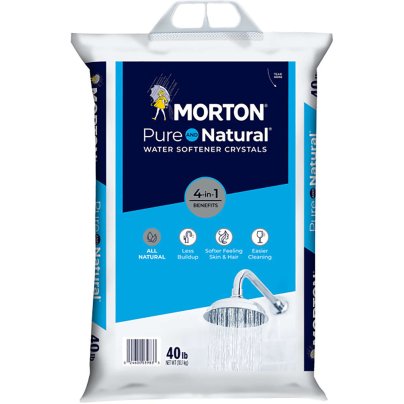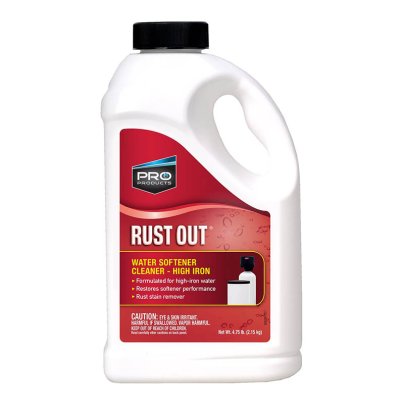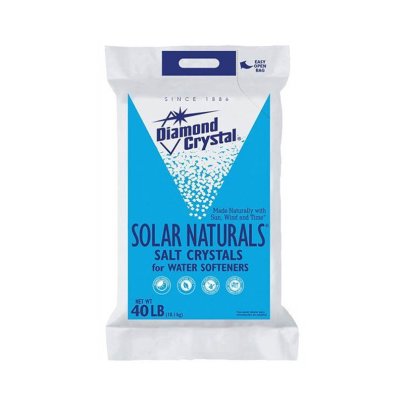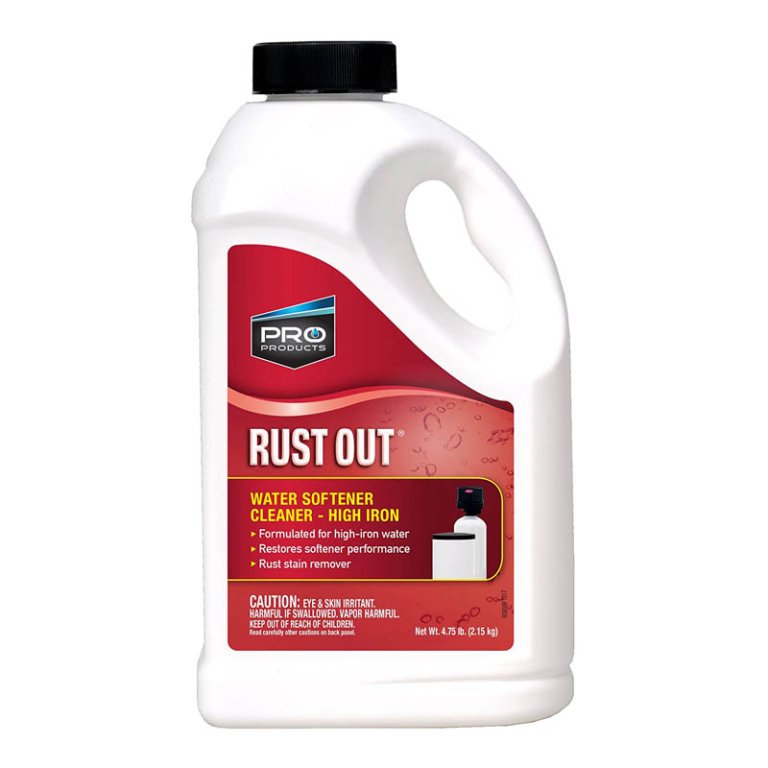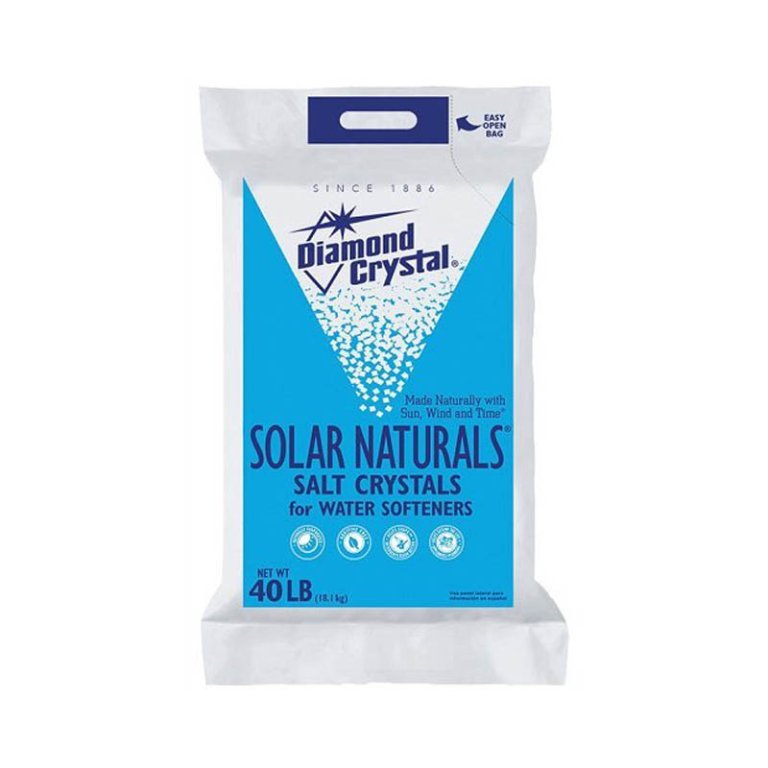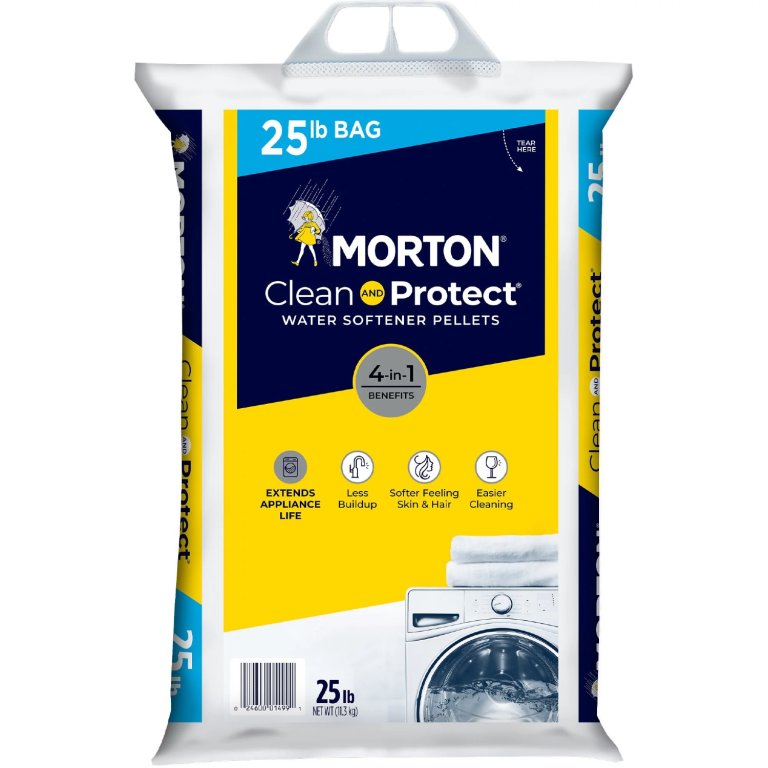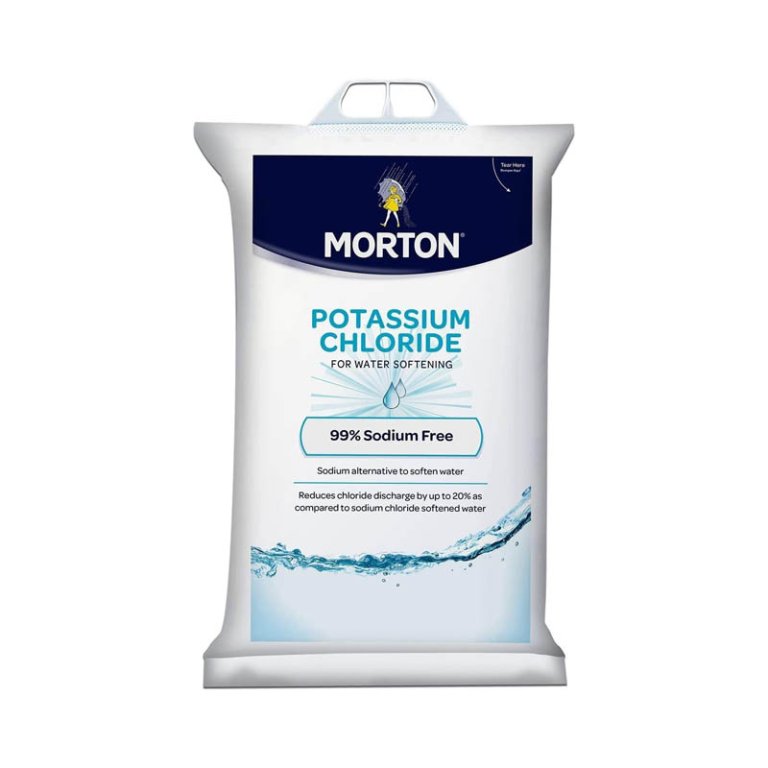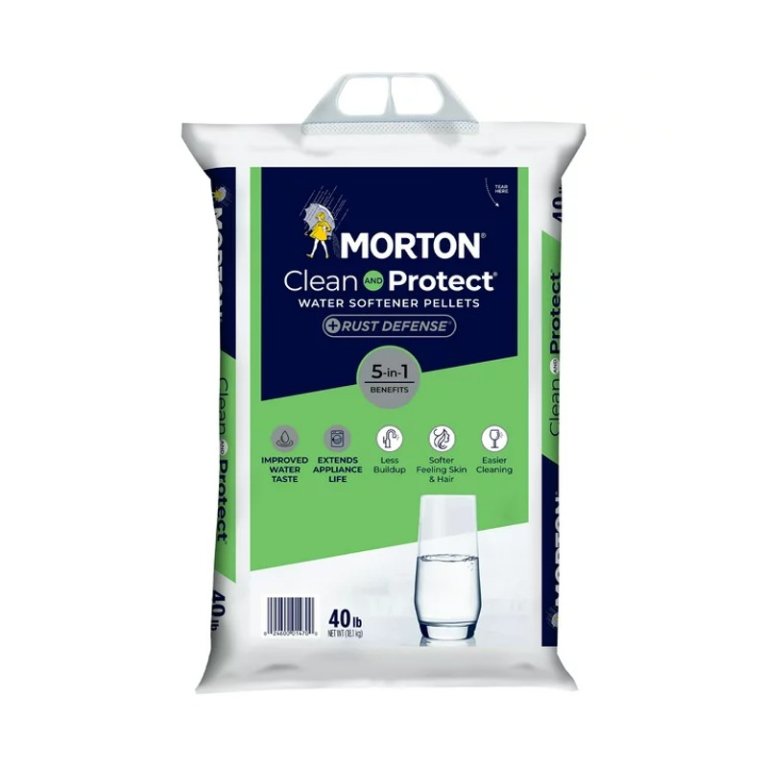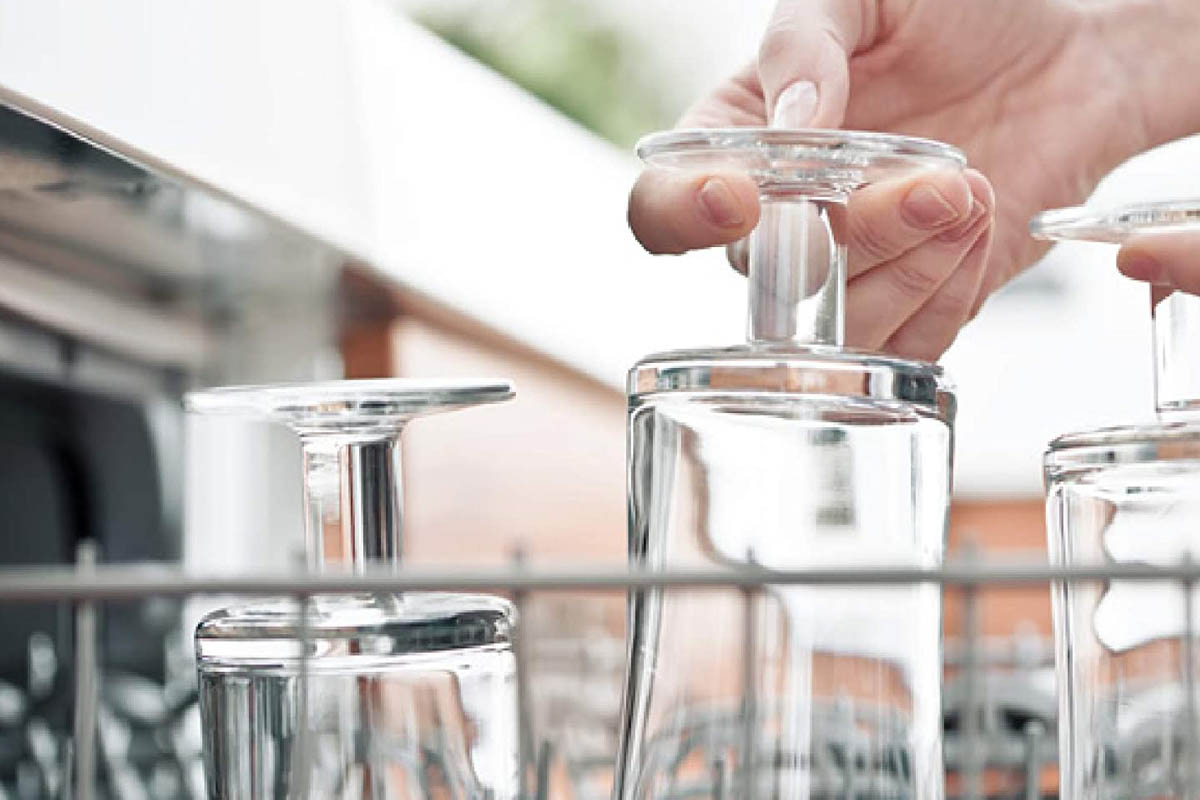
We may earn revenue from the products available on this page and participate in affiliate programs. Learn More ›
A water softener can work miracles on well water by turning rusty water clear, removing sulfur odors, and eliminating minerals that clog pipes and damage appliances—but only when it’s filled with the right softener salt.
The quality of softener salt plays a critical role in how well a softener is able to soften water. Softener salt comes in a surprising number of forms, ranging from evaporated salt pellets, sea salt, rock salt, crystals, and even saltless softeners that use potassium chloride instead of sodium chloride.
With so many options available, it can be a challenge to choose the right product for a home’s water softener. This article takes a deep dive into the world of water softeners and lists crucial factors to consider when shopping for the best water softener salt.
- BEST OVERALL: Morton Pure and Natural Water Softening Crystals
- BEST BANG FOR THE BUCK: Pro Products Rust Out Water Softener Cleaner
- BEST NATURAL: Diamond Crystal Solar Naturals Salt Crystals
- BEST LIGHTWEIGHT: Morton Clean and Protect Water Softener Pellets
- BEST POTASSIUM CHLORIDE: Morton Potassium Chloride Pellets
- BEST FOR IRON: Morton Clean and Protect Rust Defense
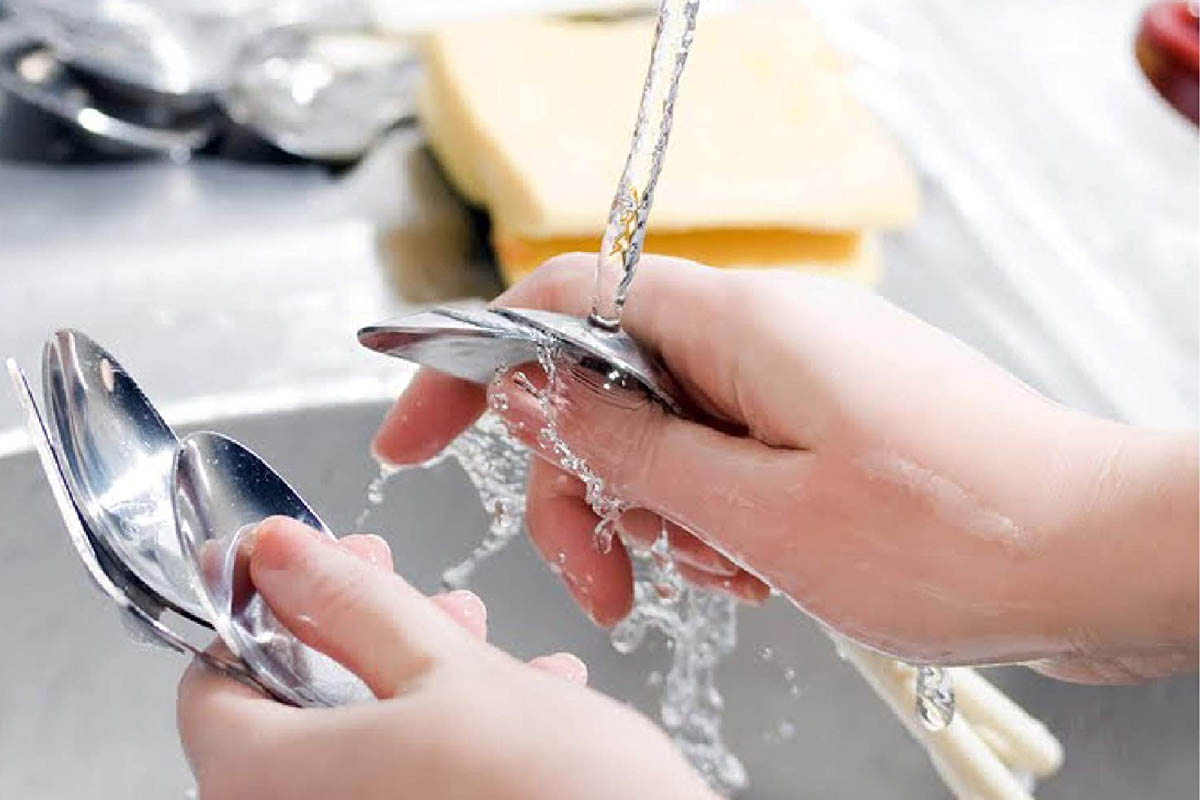
Before You Buy Water Softener Salt
Choosing the right water softener salt involves knowing what the water hardness is, and this is usually determined through testing. Water hardness can be measured by purchasing a soap test kit. This simple kit includes a bottle and vial of liquid soap with a dropper. To test the water, fill to the line, add drops of soap, and shake the bottle until the water produces suds. The more drops of soap it takes, the harder the water is.
How We Chose the Best Water Softener Salts
In building this list of favorite water softener salts, we used our own research and experience to find a selection of products that best address specific issues related to home water systems. We made sure to span the range of reputable brands available to offer shoppers the best selection for their homes. Our list includes natural choices, sodium-free options for those looking to lower their salt intake, and more potent products that can deal with iron and rust problems.
Most of our top picks come in large 40-pound bags. For shoppers looking to avoid any kind of heavy lifting, we also noted a 25-pound option that’s much easier to carry while still being just as effective.
Our Top Picks
The list below includes water softening salts that are capable of softening hard water without leaving harmful residues in the brine tank. Any of the products below will work in a saltwater softener.
Best Overall
Morton Pure and Natural Water Softening Crystals
Pros
- Bag has a sturdy plastic carry handle that makes lifting and carrying easy
- Suitable for most homes and simple to maintain—just once every 2 months
Cons
- Despite having a handle, 40-pound bag may be quite heavy for some users
Product Specs
- Type: Salt crystals
- Size: 40 pounds
- Purity: Unspecified
This natural option to Morton’s standard water softener salt consists of water softening crystals created through the natural process of drying sea salt with air. While this process doesn’t result in the 100 percent pure salt evaporating salt pellets create, it’s pretty close, at 99.6 percent.
As with other salt types, Morton Pure and Natural will reduce deposits that can clog pipes and faucets while improving the ability of clothes washers and dishwashers to clean. This softener salt comes in 40-pound bags that feature a convenient handle for carrying and pouring. To use, add two bags every 2 months for families of two or three bags every 2 months for four-person families.
Get the Morton Pure and Natural water softener salt at Ace Hardware, The Home Depot, or Amazon.
Best Bang For The Buck
Pro Products Rust Out Water Softener Cleaner
Pros
- Chemically removes iron and rust buildup that coats resin beds and fouls softener
- Relatively affordable; a great preventative way to avoid rust problems in the future
- Reduces rust staining on any household fixtures and other surfaces
Cons
- Will need to be paired with a water salt softener product for full effectiveness
Product Specs
- Type: Dissolvable powder
- Size: 6 or 12 ounces; 50 pounds
- Purity: N/A (not a salt product)
Rust Out water softener cleaner is specially formulated to combat high iron content in water, eliminating the orange stains it can cause in faucets, bathtubs, toilets, and even clothing. Rust Out functions as an additive to existing water softener salt and can be mixed into the system, either by creating a solution and adding it to the brine well or by layering a half cup of it in the well between two 40-pound bags of softener salt.
Once added, Rust Out takes a few weeks to work into the water softener before it starts working. The result is clear water, as well as tubs, faucets, and sinks that no longer have to be scrubbed with rust removal cleaners. Rust Out comes in 6- and 12-ounce bottles. There’s also a 50-pound bucket option for larger jobs.
Get the Pro Products water softener salt additive at Amazon or Pro Products.
Best Natural
Diamond Crystal Solar Naturals Salt Crystals
Pros
- No added chemicals; just 99.6 percent pure natural salt
- Minimizes any accumulation of tank residue; helps prevent scaling in plumbing, bathtubs, and sinks
- Versatile product that’s also suitable for pickling foods and de-icing walkways
Cons
- Some users report occasional contaminants mixed in with the salt
Product Specs
- Type: Salt crystals
- Size: 25, 40, or 50 pounds; 20 kilograms
- Purity: 99.6 percent
This water softener salt from Cargill’s Diamond Crystal is created by dehydrating seawater with wind and sun to create a product that includes no additives, making it a great option for those looking for an all-natural product for their water softener.
As with other salts, this product softens water, helping to prevent scaling in plumbing and film from forming in sinks and bathtubs. It also helps extend the life and improve the performance of water-consuming appliances such as clothes washers and dishwashers. With its 99.6 percent purity, this salt resists bridging (which occurs when the salt in the softener forms a rigid crust in the brine tank preventing the salt from dropping down into the softener) and mushing. It’s also safe for other applications, such as curing pickles and other foods or keeping walkways ice-free. This sea-salt water softener comes in 25-, 40-, 50-pound bags. There’s also a 20-kilogram bag option.
Get the Diamond Crystal water softener salt at Ace Hardware, The Home Depot, Blain’s Farm & Fleet, Tractor Supply Co., or Amazon.
Best Lightweight
Morton Clean and Protect Water Softener Pellets
Pros
- 25-pound bag is a great choice for those who prefer a lighter option
- Water softener pellets are usually less messy than crystal-based products
- Bag includes a sturdy carrying handle for added ease and convenience
Cons
- Quite pricey compared to similar water softener salts on the market
Product Specs
- Type: Salt pellets
- Size: 25, 40, and 44 pounds
- Purity: Unspecified
Hoisting a 40-pound bag of salt into a brine tank that’s 3 or 4 feet tall once or twice a month is no easy task. While Morton offers its Clean and Protect water softener pellets in that bag size and a 44-pound one, too, its lighter 25-pound option is great for those who struggle with heavier bags. In addition to having a lightweight option, each bag also includes a large built-in handle at the top that makes it easier to grip for carrying and pouring.
Morton’s Clean and Protect consists of evaporated pellets, which are pure salt and leave little residue to clean up. With fewer impurities, this salt can soften very hard water, helping to eliminate staining in faucets and sinks. It will also improve the performance of water heaters by eliminating impurities that make water harder to heat, such as calcium nitrate.
Get the Morton Clean and Protect water softener salt pellets at Amazon.
Best Potassium Chloride
Morton Potassium Chloride Pellets
Pros
- Ideal for shoppers who require reduced salt in their diet
- Can help make household soaps and detergents much more effective
- Built-in carry handle makes it easier to carry and pour
Cons
- Some may consider 40-pound weight of the bag too heavy to carry Pricier than comparable water softener salt options of the same weight
Product Specs
- Type: Pellets
- Size: 40 pounds
- Purity: Unspecified
For those living with high blood pressure or other health conditions that require a reduced salt diet, traditional water softener salts just aren’t an option. Morton’s Potassium Chloride Pellets offer an excellent option. This product is 99 percent sodium-free, ensuring it won’t affect the daily salt intake of residents in the home, and adds blood-pressure-lowering potassium to the water.
As with salt-based softeners, Morton Potassium Chloride Pellets soften hard water, helping to prevent scaling on pipes or inside appliances while making soaps and detergents used in the home sudsier and more effective. Morton potassium chloride comes in 40-pound bags with a built-in handle that makes it convenient for carrying and pouring. To use, add a bag of potassium chloride pellets to the brine basin each month.
Get the Morton potassium chloride water softener salt at The Home Depot.
Best For Iron
Morton Clean and Protect Rust Defense
Pros
- Helps improve the taste of water and extend the life of appliances
- Removes 10 times more iron than plain salt, leaving fewer rust stains
- Recommended by other trusted brands, including Whirlpool, Northstar, and EcoPure
Cons
- Some may consider the 40-pound bag too heavy to carry
Product Specs
- Type: Pellets
- Size: 40 pounds
- Purity: Unspecified
Anyone with high iron content in their water is familiar with the unsightly rust stains that form on faucets, tubs, and toilets as the iron in the ground oxides in the water. Specially formulated to turn orange rusty water clear, this water softener is 15 times more effective at reducing iron content in water than other standard salt softeners. This means no more rust stains on clothes or in toilets and faucets.
It also reduces scaling in pipes and appliances, helping to extend the life of water heaters, washing machines, and dishwashers. Morton Rust Defense comes in 40-pound bags, which should be added to the brine basin twice every 2 months for small households and three times every 2 months for larger families.
Get the Morton Rust Defense water softener salt at Blain’s Farm & Fleet.
Jump to Our Top Picks
What to Consider When Choosing the Best Water Softener Salt
While the type of salt largely determines how effective it is at softening water, there are other factors to consider as well, including purity and water hardness. Read on to learn more about these and other important characteristics of water softener salt.
Type
There are numerous options to consider when selecting the type of salt for a water softener, including sea salt, rock salt, crystal, pellets, and potassium chloride.
- Salt crystals are created by expelling a mixture of salt, brine, and water to the wind, which evaporates the water, leaving about 99.6 percent sodium chloride. This style of water softener salt is best suited for households that consume a lower than average amount of water or those that use a two-part water softening system, otherwise, it’s prone to bridging, which occurs when the salt in the softener forms a rigid crust in the brine tank.
- Solar sea salt is produced by evaporating seawater, hence its name. Solar salt is more soluble than other types of salt and is available in up to 99.5 percent pure form. While it’s less expensive than evaporative salt, its higher percentage of impurities prevents it from dissolving easily in harder water—making it ideal for homes with minor water softening needs.
- Rock salt consists of irregularly shaped pieces of salt that resemble rock. While rock salt is chapter, it’s not as pure as other more expensive salts. This is because it contains a significant amount of calcium sulfate. It doesn’t dissolve as well as purer softener salts in water and will leave a residue in the softener’s brine basin, which will need to be cleaned frequently.
- Evaporated salt pellets are made from refining salt crystals into pure sodium chloride. This process creates 100 percent pure salt, making evaporated salt pellets the best option for use in water softeners. Salt pellets dissolve easily in water and won’t leave a residue. They’re also more expensive than other water softener salts.
- Potassium chloride is a good alternative to salt softeners for those with high blood pressure or other salt-related health concerns. Potassium softens water and has the added benefit of lowering blood pressure.
Purity
Purity refers to the percentage of material other than salt that is present in the product. The purer the salt, the less insoluble material such as rocks and earth it contains. Pure softener salt lasts longer than salt with impurities and won’t leave residue in the softener’s brine basin. Pure salt also easily dissolves in the softener, reducing the risk of bridging or clogging and making the entire system more efficient. Most softeners are at least 99.5 percent sodium chloride. The highest quality water softener salt, evaporated salt pellets, are 100 percent pure.
Water Hardness and Usage
The type and amount of salt needed for a home depends on the size of the household and the hardness of the water. Small households with two people use about two 40-pound bags of salt in their water softeners every 2 months. Families of four use about three 40-pound bags every 2 months, while large families may go through four bags every 2 months.
Homes with a high level of minerals in their water such as magnesium and calcium will require more salt. A water softener for a four-person home that typically requires three bags of salt every 2 months may need four or more bags every 2 months if the home has particularly hard water. Homes with hard water should use evaporated salt pellets to get the most out of each load of salt.
Maintenance Preferences
The type of salt can also have a significant impact on water softener maintenance. Impurities in the salt leave deposits in the water softener. As these deposits build up, the softener must be flushed to remove them. Eventually, these deposits can wear down the internal parts of the softener, shortening its life. Water softener salts with a low percentage of impurities, such as evaporated pellets, leave fewer deposits, extending the time between maintenance for the water softener.
The type of water softener salt can also impact bridging. Bridging occurs when the salt in the softener forms a rigid crust in the brine tank. This “crust” prevents the salt from dropping down into the softener. Because bridging typically takes place well below the visible top layer of salt in the tank, this problem usually goes undetected until the water quality is impacted.
Bridging requires the user to break up the salt manually to keep the salt flowing into the water softener. Salts with a greater percentage of impurities are more likely to cause bridging in the brine tank than purer salts.
The Advantages of Using Water Softener Salt
The benefits of using water softener salt, in conjunction with a water softener, are many.
- Healthier skin and hair: hard water can damage hair and dry out the skin. A water softener can prevent that damage by eliminating harmful impurities.
- Improves taste: Water softeners help to remove bad tastes created by iron, magnesium, fluoride, and other minerals and chemicals, making it safer and more palatable to drink.
- Improves the performance of hot water heaters and prevents clogging: Calcium can cause build-up that slowly clogs water supply pipes. Calcium does not conduct heat, so its presence in water forces a hot water heater to work harder to warm water, shortening the life of the water heater while raising utility costs. Water softening prevents these problems by eliminating calcium from the water.
- Improves the performance of soap: Soap works better with soft water, allowing hand soaps and shampoos to work more effectively, and dishwashers and washing machines to do a better job of cleaning dishes and clothes.
FAQs
If you’re wondering what’s in water softening salt or how it can be used for other purposes, then read on for answers to some of the most commonly asked questions about water softener salt.
Q. Does it matter what kind of salt I use in my water softener?
The type of salt you use in your water softener does make a difference. While all salts will soften hard water, pellet salts will do so more efficiently because they are purer. Salts that include rock and earth leave residue inside a water softener, requiring the user to clean it more often.
Q. Does softening salt contain chemicals?
Most softener salt is made from hydrogen chloride, which is very similar to table salt. Salt-free water softeners are made from potassium chloride.
Q. Can I use softening salt for other purposes?
Softening salt can also be effective for other purposes. It can be used for melting ice and snow from walks, killing weeds in a garden, pickling foods, or making ice cream, although it’s a good idea to ensure the product is food safe before using it around food.
Q. How often should I add salt to water softeners?
This depends on the size of a household. A water softener serving a four-person family requires three bags of salt every 2 months, whereas a water softener for a household will go through about two bags every 2 months.
